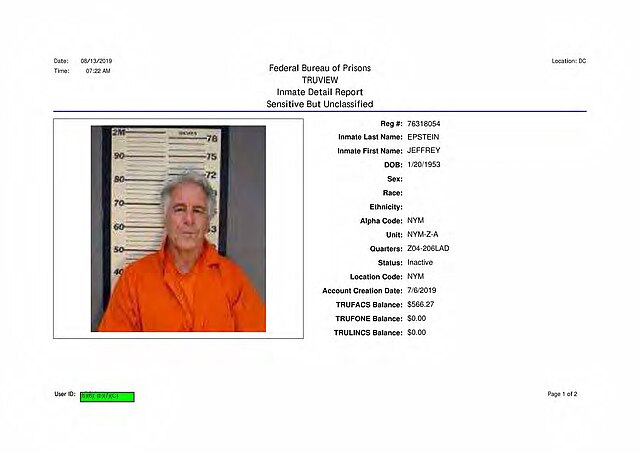
Journalist and author Julie K. Brown from the Miami Herald’s Investigative Team, joins This Is Hell! to talk about her work uncovering and investigating the Epstein Files, which can be found on her Substack, where she is still breaking new stories on the case.
We will have new installments of Rotten History and Hangover Cure. We will also be sharing your answers to this week's Question from Hell! from Patreon.
Help keep This Is Hell! completely listener supported and access bonus episodes by subscribing to our Patreon.
Welcome to the Moment of Truth: the thirst that is the drink.
Up here in Antrim County, MI, there’s a rumor afoot that the founder of the Friske family orchards was a real live runaway Nazi. Well, not really a rumor at this point. He was a pilot for Hitler’s Luftwaffe.
But for a long time, it’s said, he used to refer to himself merely as a WWII veteran. Maybe to avoid the bad association some folks have with those who fought on behalf of the Third Reich. And I don’t blame the guy for concealing it. US citizens – those who call themselves “Americans”—are a bigoted bunch. There was a time when resentment of Germans was so strong here, people changed the word “sauerkraut” to “liberty cabbage” in casual conversation. And what could be more casual than talking about fermented shredded cabbage?
So, somehow, Richard Friske, who arrived in the US with his wife, Olga, in 1952, figured that in order to better disguise his German Nazi fliegendermann background, he could do worse than to don the mantle of US neo-Nazi, so he joined the John Birch Society, supported George Wallace for president in ’68, and got his entire family to be rabid nativists. The Friskes donate to David Duke, Rick Santorum and a number of other brainless spewers of hate against immigrants, homosexuals, and uppity city slickers like yours truly.
People up here still tell about the Friske’s no-mask policy during the pandemic lockdown. One letter to the editor of The Petoskey News-Review vowed never to return after seeing the workers in the kitchen handling food unmasked during the height of the Covid-19 pandemic. It was part of Friske’s policy “of allowing staff and customers to make personal choices regarding their health.” It sounds like they want us to be able to pick our own doctors, or maybe get an abortion should we choose one, but really they just want to give everyone the freedom to spread whatever infections they might be harboring.
The letter-writer concludes by mourning that they will never again enjoy the taste of Friske’s cherry doughnuts. The ones in the brown paper bag with grease stains indicating freshness.
Friske’s wasn’t just a passive spreader of the virus. They’ve held a couple super-spreader events in their parking lot, to bawl and whinge about the tyranny of the face mask mandate and how Democrats were out... read more
Welcome to the Moment of Truth: the thirst that is the drink.
I was going to talk about magic as if there is an enemy by the name of Dawkins Harris Hitchens whom I must rebut, rebuke, and spank, lest humankind plunge into disaster. I was going to talk about magic as a food, a necessity. Why? Because this week has been so rollercoaster, I can’t get a grip on it. I can barely get a foothold on the slippery sizzling Earth.
Kind of a mixed bag this week or so, is what I’m saying. We’ve got a building collapse with 150-something people missing, but we really won’t know how many till we dig them out. It’s similar to the building disaster in London last year. And there’s a similar sense that Reagan and Thatcher’s plans to starve the public sector is really starting to bear fruit.
Of course, both collapses are reminiscent of 9-11, but we can’t possibly blame that on imperialist overreach and the immanent downfall of the West, can we?
But on the up side we did have some criminal indictments come down against the Trump team, and Rudy Giuliani lost his license to practice law.
But then again the Pennsylvania Supreme Court let convicted rapist of unconscious women he himself drugged unconscious, Bill Cosby, out of jail. And there was a PhD white supremacist shooter who killed two Black people in an incident in Massachusetts no one’s talking about.
And the Pacific Northwest is now the same temperature as the surface of Mercury. Ups and downs, good news/bad news.
But yesterday, the final day of Pride Month – I’d like to tie this in with Pride Month –Donald Rumsfeld, demented fascist war and peace criminal under no less than five administrations, up and died. So, all right! As they say in poker, “call!” He and Dick Cheney were joined at the junk early on under Nixon. Reagan was their third boss. Reagan was to AIDS and HIV what Trump is to Covid 19. Maybe Rumsfeld didn’t have much to do with that part of the Reagan regime, but it’s still good he died.
Hurrah, huzzah! Rumsfeld’s dead, Rumsfeld’s dead, everybody dance and sing!
We can close this all on an up note! Right? Rumsfeld, dead, that is big and beautiful enough to take center stage as the curtain rings down on June 2021. Closing Pride Month with Rumsfeld losing his one precious garbage life is the splash! It’s like there was a new star born in the sky over... read more



